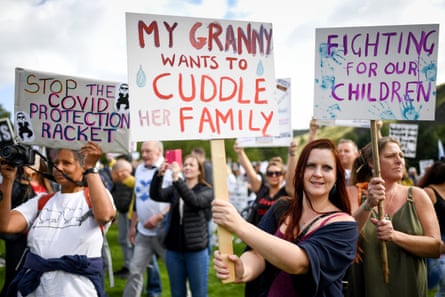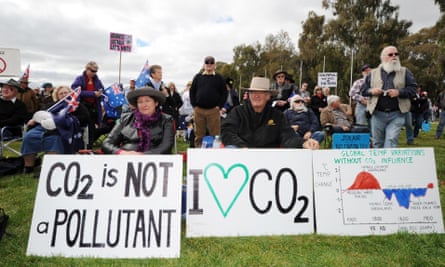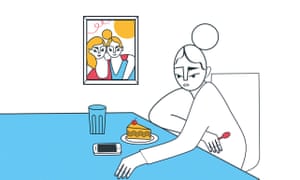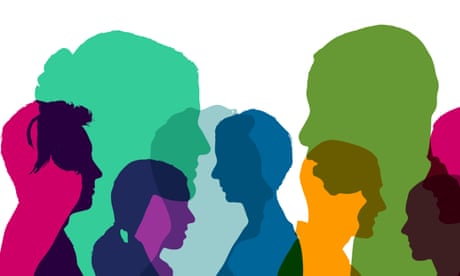If departing the EU has failed to deliver, why is the UK still so divided? Seven years on, we ask behavioural psychologists if cognitive dissonance can be overcome> Tim Adams in The Guardian
One of the most significant political events of the past few months, it has seemed to me, wasn’t strictly a bit of politics at all, but an emotional catch and quaver in the voice of a politician. The politician was the Conservative MP Steve Baker and the sudden sob in his throat came about during a TV interview about the efforts to resolve the Northern Ireland protocol.
Baker, you will recall, was one of the most strident voices in the Brexit argument, a leader of the Tory European Research group, the ERG, which frustrated Theresa May’s efforts to find a compromise deal with the EU. The sob in his voice and the tears in his eyes prefaced a short, heartfelt confession about the extreme private stress that those Brexit machinations – and subsequent arguments over Covid lockdown – had caused him. Speaking subsequently to the Times, Baker expanded on that state of mind. “I felt absolutely worthless,” he said. “I felt repugnant, hateful, to blame for all of the troubles that we had, absolutely without any joy, constantly worried about everything to the point of mental torment. A constant state of panic attacks and anxiety. It’s not a state anyone should live in.”
Matters came to a head in November 2021 at a weekly prayer group that Baker, a Christian, attended in Westminster. “I suddenly just started crying,” he recalled. “I couldn’t control it. I couldn’t speak. I was just clutching myself, sobbing my heart out.” One of the reasons that he was opening up about that now, he said, was that “I’m very conscious there’s lots of people out there who blame me for their misery. But it’s an unfortunate thing on this question of leave and remain that leaving has caused a great deal of anxiety and anger and depression for a lot of people. But being in the EU has caused a lot of anxiety and anger and depression for people…”
Baker’s courageous candour was significant in our national conversation, it seemed to me, for a couple of reasons. For one thing, that outpouring was, to my knowledge, the only public occasion on which a leading Brexiter had owned up to the pain of doubt and anguish that the referendum had occasioned. It was, also, a very telling illustration of a truism about the whole ongoing cataclysm: that, though the vote obviously had fundamental real-world consequences for our economy and our politics, it was arguably best understood as a psychological rather a political moment.
From the outset, headline writers recognised and amplified the internalised crises behind the politics in references to “Brexhaustion”, “Strexit”, “Branxiety” and “Brexistential crisis”. The referendum result, then and now, was (for remainers) an act of visceral “self-harm”. In the days after the result, the Guardian reported that “therapists everywhere” were experiencing “shockingly elevated levels of anxiety and despair”, with mental health referrals “[starting] to mushroom”. There was a clear spike in the prescription of antidepressants. By January 2019, a YouGov survey found that two-thirds of British adults were either “fairly unhappy” or “very unhappy” because of Brexit; one-third of leave voters were in that latter category.
Seven years is sometimes thought of as a moment of settled change. It is understood, not quite exactly, as the period of time in which nearly all the cells in our bodies have been replaced. The Brexit-made divisions of 2016 persist, however. Though there is some anecdotal and polling evidence that there has been a shift in sentiment, and that remain might now prevail, the same polls show very little appetite to reopen the question. When the BBC did an anniversary Question Time in June, only one half of the divided nation was even allowed in the studio – the audience was made up entirely of those who voted leave, presumably to ensure the debate would not simply descend into an all-too familiar slanging match. (It was as if the marriage guidance counsellor had been forced to separate the warring parties outside.) If there is one certainty about the coming political conference season it is that considered arguments for and against Brexit will not be aired. The Tories will crow about Brexit being done. The Labour frontbench will solemnly observe that past tense, and avoid the B-word, as if it is a triggering trauma for the party and the country, best left undisturbed.
If the language of psychology and identity was always the lexicon with which we understood Brexit, the denialism of our current politics insists that it remains so. With this in mind, in the course of the past week, I have been speaking to some of the behavioural psychologists who initially examined some of the choices of the referendum, to see if they now saw any way out of current entrenched divisions. (One of the triggers for this inquiry in my own mind was reading a new book called The Art of the Impossible, the inside story of Nigel Farage’s short-lived Brexit party. Revisiting the ingrained anxieties of that period was a version of the addictive chest-tightening outrage that comes from a daily scroll through the culture war of my Twitter feed.)
One of the key mechanisms that all psychologists agree has defined the binary choice of the referendum is cognitive dissonance. That is the powerful internal mechanism in each of us that demands consistency in our understanding of the world, and which desperately looks for ways to correct or manage information that contradicts understanding. The term was coined by a young behaviouralist in the 1950s, Leon Festinger, who came to it after studying a religious doomsday cult that saw its date for apocalypse come and go. Cognitive dissonance described the jarring pain of cultists seeing prophecy unfulfilled and the immediate strategies to explain it away.

“A man with a conviction is a hard man to change,” Festinger wrote. “Tell him you disagree and he turns away. Show him facts or figures and he questions your sources. Appeal to logic and he fails to see your point. But suppose he is presented with evidence, unequivocal and undeniable evidence, that his belief is wrong: what will happen? The individual will frequently emerge, not only unshaken, but even more convinced of the truth of his beliefs than ever before. Indeed, he may even show a new fervour about convincing and converting other people to his view.” Welcome to Brexit.
The American social psychologist Carol Tavris has spent her academic career partly developing Festinger’s work. That wisdom is distilled in her book (co-written with Elliot Aronson) called, perfectly, Mistakes Were Made (But Not By Me). At the time of the Brexit referendum seven years ago, Tavris noted that “once we have made a decision, our mental doors tend to close… it is always easier to continue to justify a belief than to change it.” As a result, she suggested, Britain – like America under Trump – tribally divided, faced with all sorts of evidence that campaign promises were utter falsehoods, was “awash in dissonance”.
Little of that, Tavris suggested to me last week, has gone away. “Most of us tend to hold the belief that we are essentially good and moral and competent,” she says. “And if I fear I did something bad, foolish or wrong, that fear challenges that belief we hold about ourselves. Then I have a choice: either I can accept this new information and say, ‘I guess I really screwed up here’, or I can say, ‘Sod off with your stupid evidence’.” This latter response, she suggests, is the default.
Her book uses a metaphor she calls the pyramid of choice. At the top of the pyramid, before a choice has been made, an individual is at his or her most open-minded. But as soon as you step off the top in a particular direction, efforts will already be being made to justify that decision. “By the time you’ve made five, or six or seven steps down that pyramid, renewing your commitment to that decision, rehearsing that decision, the harder it will be for anyone to go back up to the top.”
She points to lots of evidence that shows that even if people – judges for example - are given a face-saving way to declare they have got something wrong, they are still unlikely to accept or declare it.
So what kind of conversation helps people move past that dissonance and accept the evidence of reality (that, say, £350m won’t be given to the health service and there won’t be an easy trade deal with the US – or that Brexit is not to blame for every aspect of the cost of living crisis)?
“When we argue with somebody about their beliefs,” Tavris says, “the absolute crucial thing to avoid is making them feel foolish. If you say something like, ‘How could you be so stupid?’, that will almost always make your listener become even more committed to their belief. If you say instead, ‘Well, many of my own expectations turned out not to be the case too’, that might be a place to start.”
Psychologists are, of course, not immune to the biases they identify. How does she maintain doubt in her own beliefs? Well, she says, “it’s that old idea of being open-minded, but not so open that your brains fall out. You want to have ideas you live by and feel passionately about. But the goal is to hold them lightly enough so that [if the evidence changes] you can also let them go.”
The more I read into the science of psychological polarisation, the more often ideas of “neuropolitics” crop up. This is the fairly new science that examines – with the help of fMRI brain scans – questions of political allegiance in the context of brain structure and activity. Perhaps the leading researcher in this area in the UK is Darren Schreiber, at Essex University, author of the Your Brain Is Built for Politics. I call to ask him if the differences between “leaver” and “remainer” responses to the world are so baked in as to be visible in brain activity?
Schreiber is circumspect about the current reach of his discipline, beyond broad observations. “If you’re a conservative, or if you’re a liberal, there are consistent patterns that emerge,” he says. Different experiments in brain imaging “can classify political affiliation with about 70%-plus accuracy based on brain structure, and with brain activity at an even higher rate, 80%-plus”. In very simplified terms, the amygdala, the part of the brain that processes fear and threat, appears more sensitive to certain stimuli in republican or conservative brains.
Probably more significant, Schreiber suggests, is the fact that our brains are hardwired to be excited by politics in general.
Even raising the issue seems provocative. We just can’t talk about [Brexit] any moreNick Chater, behavioural scientist
“Though we all have these underlying predispositions at the genetic level, to be a little bit more conservative or a little bit more liberal, these can be altered by environmental circumstances. And by far the most important environmental circumstances, if you’re a human, is your social milieu. If you’re an ant you can tell who is ‘us’ and who is ‘them’ with a very quick sniff. If you are a human it is more complex, and we put lot of work into that.”
That mental effort is subject to Hebb’s law, which holds that “neurons that fire together wire together”, that is to say, the brain itself starts to be shaped in tiny pathways by the associations it is most often exposed to, a sort of internal echo chamber.
How easy is it to change that wiring?
“It’s really hard,” Schreiber says. “We see tremendous stability over very long periods of time.” A choice like Brexit provides endless stimuli to feed that brain activity. “It’s coalitions within coalitions within coalitions…” Schreiber says.
Nick Chater, professor of behavioural science at Warwick Business School, approaches those stubborn social networks from a different perspective. In the aftermath of the referendum, he led a discussion on Radio 4’s The Human Zoo into the psychological fallout of Brexit, the hardening of decision into identity. He laughs a little when I ask him if there is any kind of time limit on cognitive dissonance.
“Behavioural psychology very rarely looks at the long term,” he says. “So I think actually, psychologists have fairly little idea how long these things tend to last.”
What he finds striking about the current situation is the almost total absence of debate about the effect of the decision itself. “It’s become so divisive, that even raising the issue seems almost a provocative act. There’s a sense that we just can’t talk about this at all any more.”
Does he see a strategy that would allow that to change?
“One of the things might change is if one could get to a point where we can reframe the debate. Say if the EU clearly broke into a two-speed Europe where there was a central core engaging in really deep integration and an outer rim more loosely connected…”
And what about the kind of language that might prompt a rethink?
“The most useful language would recognise that politics is inherently uncertain,” he says. “So: ‘We thought it would be a bad idea; you thought it would be better; but nobody really knew for sure. Now we know a bit more, and perhaps it’s time to rethink…’”
Does he hear much evidence of that?
“Not a great deal…”
Perhaps the most extensive examination of the referendum in these terms came in a book called The Psychology of Brexit, written by Brian Hughes, a specialist in stress psychophysiology and a professor of psychology at the University of Galway, Ireland. “Brexit,” Hughes argued, “emerged from psychological impulses, was determined by psychological choices, is construed in terms of psychological perceptions, and will leave a lasting psychological imprint.”
At the heart of the choice, Hughes suggested, were two persistent fallacies. First, the notion that people ever approach political questions with clear-headed reason. Second, the idea that your opponents have cornered the market in irrationality. “Remain did not have a monopoly on reason. This is because remainers are human beings.”
When you pathologise the other side, there’s no point in reaching out to themBrian Hughes, psychologist
Hughes’s book came out in 2019 at the height of “no deal is better than a bad deal” insanity. If he were to add to it now, he suggests, it would be as a textbook case of “polarisation theory” and the ways in which the three-word sloganeering of “Brexit means Brexit” and “get Brexit done” has been repurposed to provide the illusion of simplicity to other very complex issues – “stop the boats” etc. The primary division of Brexit has extended into “clusters of interwoven views” on the climate crisis, vaccination and immigration, feeding everything into the same blunt binary.
One result of that, he suggests, is that Brexit has become a classic example of toxicity. “If there is something especially scandalous in our own lives or traumatic, we will try not to mention it. It just brings too much up. People talk about the ‘Ming vase strategy’ for Labour and Brexit [the idea that they must not smash their precious majority]. The political logic is that this event was still so painful for people that you could lose half the electorate as a result of one soundbite.”
If there is a way through this, he suggests, it is to break down the myths of us and them. “Brexit was obviously never the single will of the people, but also the will of leavers and the will of remainers are very far from homogenous. Politicians need to find ways of foregrounding the diversity of views that people had and have, even if some of them might be very ugly. They need to show the illusion of simple polarisation.”
Preventing this, he says, is the fact that Brexit has brought into the political mainstream “all the reasoning errors that people make”. Polarity acts against nuance, and undermines the middle ground. “Both sides start to look at the other as somehow irretrievably deranged. And when you pathologise the other side, there’s no point in reaching out to them.” As a result, he suggests, “People who have the opportunity to address political challenges are no longer seeking to control the divisions in society, they are trying to maximise them for their own ends.”
Does he see an end to that polarity?
“It would require politicians and commentators to take some of the heat out of the arguments,” he says. “That might take a generation, or it might be one of these cyclical trends.” For the time being, our Brexity brains are it seems here to stay.




